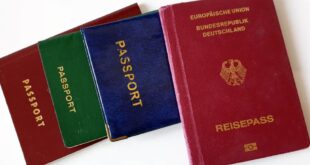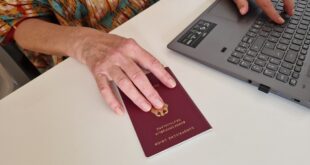The newly-elected German Bundestag, the lower house of the federal parliament, convened for the first time on Tuesday (26 October).
The inaugural meeting of the parliament, taking place about four weeks after the general elections, marked the official start of the 20th legislative period.
The parliament held its first session, with one of its first acts being to elect Bärbel Bas of the SPD as the President (or speaker) and other principal members. Ms Bas is the third woman to told the position.
At least 83 members of the new Bundestag, which has 735 members in total, have a migration background, as research by MEDIENDIENST shows. This amounts to a share of 11.3 per cent – about three percentage points higher than after the previous Bundestag election (2017: 8.2 per cent or 58 MPs with a migration background).
The proportion of MPs with a migrant background has thus increased for the third time after 2013 and 2017 elections.
Thirty-one of the MPs with a migrant background have a connection to countries of the European Union; of these, six have links to Italy and five to Poland.
Eighteen MPs are of Turkish origin (in 2017 there were 14 MPs), six have an Iranian background while four have their roots in the African continent.
MPs with a migrant background in the parliamentary groups:
- The Left: 28.2 percent
- The Greens: 14.4 percent
- SPD: 17 percent
- AfD: 7.2 percent
- FDP: 5.4 percent
- CDU/CSU: 4.1 percent.
The Left Party has the highest proportion of MPs with an immigrant background, 28.2 per cent. Here, the proportion of persons with an immigration history is higher than the proportion in the population as a whole (about 26 per cent).
In the new SPD parliamentary group, 17 per cent of the MPs have a migration background. In 2017, it was still 9.8 per cent.
In the Greens, the proportion of MPs with an immigrant background has fallen slightly: from 14.9 to 14.4 per cent.
READ ALSO Meet the four Afro-Germans elected into the Bundestag
The proportion of MPs with an immigrant background in the AfD is 7.2 per cent (2017: 8.7 per cent).
For the FDP, it is 5.4 per cent (2017: 6.3 per cent).
The CDU/CSU parliamentary group is still the parliamentary group with the lowest proportion of people with a migration background: 4.1 per cent (2017: 2.9 per cent).
Immigrants and their descendants account for up to ten per cent of eligible voters and 26 per cent of the population as a whole.
The new parliament is the world’s biggest democratic lower house of parliament for a single country, with 735 members compared with 709 in the previous legislative assembly. It also brings together six parliamentary parties – CDU, CSU, SPD, Greens, FDP, The Left and AfD. The Left does not have an official parliamentary group as they failed to win at least 5 per cent of the popular vote at the elections.
Femi Awoniyi
 THE AFRICAN COURIER. Reporting Africa and its Diaspora! The African Courier is an international magazine published in Germany to report on Africa and the Diaspora African experience. The first issue of the bimonthly magazine appeared on the newsstands on 15 February 1998. The African Courier is a communication forum for European-African political, economic and cultural exchanges, and a voice for Africa in Europe.
THE AFRICAN COURIER. Reporting Africa and its Diaspora! The African Courier is an international magazine published in Germany to report on Africa and the Diaspora African experience. The first issue of the bimonthly magazine appeared on the newsstands on 15 February 1998. The African Courier is a communication forum for European-African political, economic and cultural exchanges, and a voice for Africa in Europe.


































